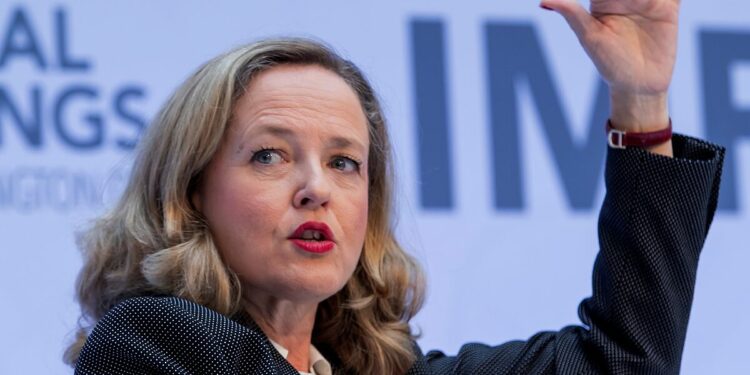Nadia Calviño urges IMF to strengthen global financial safety net, tackle debt vulnerabilities
In a speech delivered at the IMF/World Bank Annual Meetings in Morocco, Ms. Nadia Calviño, the Chair of the 48th Meeting of the International Monetary and Financial Committee (IMFC) and Spain’s First Vice President and Minister for Economy and Digitalization, outlined a comprehensive assessment of the global economic landscape.
Ms. Calviño noted that the global economy exhibited remarkable resilience, with a slight upgrade in the 2023 growth outlook since the Spring. However, she underscored the persistence of unevenness in the recovery, as many economies continue to lag behind pre-pandemic levels. Furthermore, divergences among countries are on the rise, casting shadows over medium-term global growth projections.
The speech highlighted that while global headline inflation had receded in several regions, it remained stubbornly above target levels in others. Core inflation, contrary to expectations, proved to be more enduring. Ms. Calviño acknowledged that decisive measures taken in early 2023 had balanced near-term risks, although they still leaned towards the downside.
A myriad of factors, including the ongoing conflict in Ukraine, escalating debt vulnerabilities, tightening financial conditions, the mounting impact of climate-related events, growing inequality, the challenges posed by refugees and displaced populations, food insecurity, and the risk of global fragmentation, all feature prominently on the list of concerns for the global economy. These challenges, she pointed out, disproportionately affect the world’s most vulnerable countries and populations.
The overarching priorities in this context, as laid out by Ms. Calviño, encompass the imperative to consistently reduce inflation, maintain financial stability, ensure fiscal sustainability, protect the vulnerable, and promote inclusive and sustainable long-term growth. Central banks across the globe are poised to calibrate their policies in a data-dependent manner to achieve these objectives while clearly communicating policy goals to mitigate negative cross-country spillovers.
The role of international cooperation and multilateralism was highlighted as essential for global growth and the stability of the international monetary system. Commitments to exchange rate policies, addressing excessive global imbalances, and safeguarding a rules-based trading system were reaffirmed.
One of the cornerstones of the strategy outlined in the speech was the strengthening of the global financial safety net, with the IMF taking a central role. Addressing global debt vulnerabilities and supporting climate and digital transitions are also top priorities.
Ms. Calviño’s speech expressed support for the IMF’s efforts to tailor its advice to assist member countries in navigating economic and financial challenges. This involves mainstreaming climate, digital, gender, and fragile state strategies. The speech emphasized the need for specific attention to the unique challenges faced by small developing states.
Ms. Nadia Calviño’s speech underscored the importance of a quota-based and well-resourced IMF at the center of the global financial safety net. It further endorsed the IMF’s critical role in providing financial assistance and debt vulnerability management. Capacity development, improved representation, and diversity within the IMF were also emphasized.
Ms. Calviño’s remarks provide a comprehensive overview of the challenges facing the global economy and the strategies required to address them, underscoring the pivotal role of international cooperation and the IMF in this endeavor.









